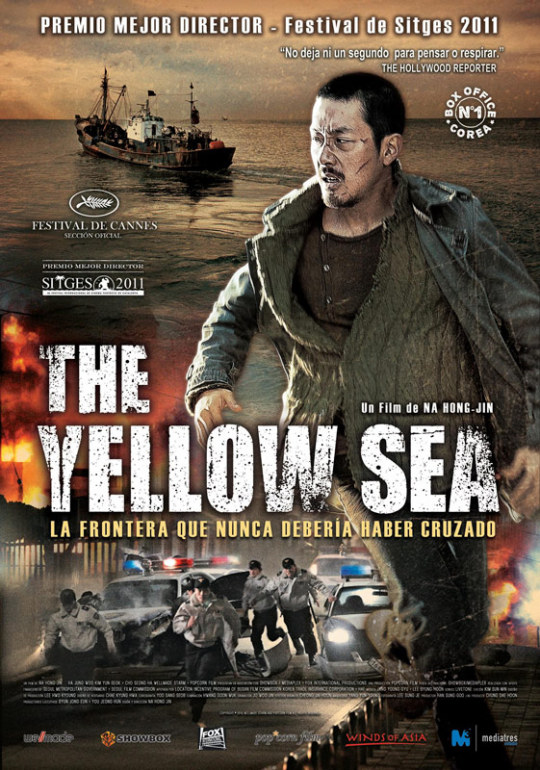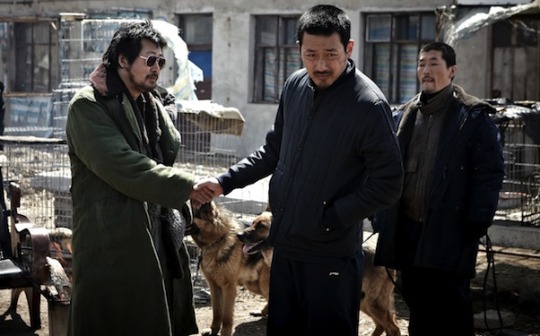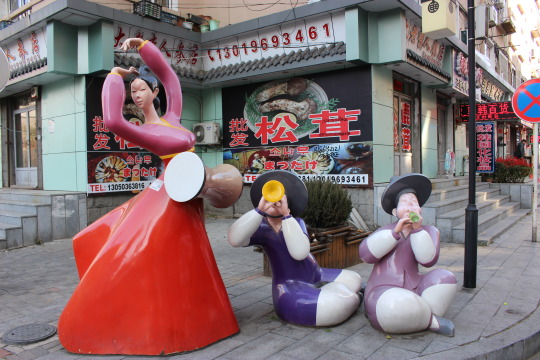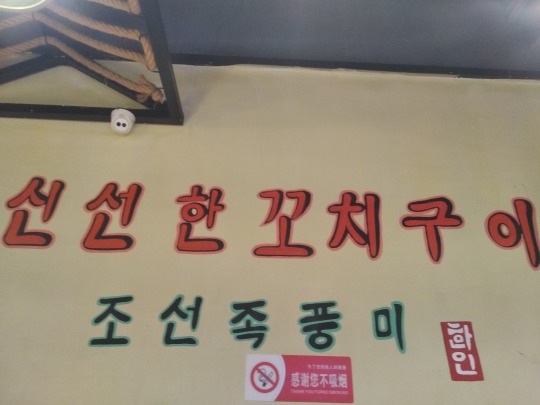#Joseonjok
Photo

8 notes
·
View notes
Text
I found this leed, a likely sway on Koryo-Mar. One thing's for sure, it's distinct & is almost only spoken among the elder lines/generations Jaegaseung people (whose heritage language is lost) & Jaejung dongpo (ethnic Koreans in my southern neighbour's country) plus about 1 in 10 of Koryo Saram (from ex-Soviet countries including from my northern & western neighbours & excluding Sakhalin Koreans, who instead speak from one based off a landspeech/dialect from southern parts [Jeolla & Gyeongsang] of South Korea despite writing by North Korean standard). Not quite the same thing as the Hamgyong landspeech, but it's closer to Korean than is Jejuan, even though neither are really mutually understandable with Korean landspeeches or especially the North or South standard leeds. Apparently, a wordbook (dictionary) bestands/exists between Korean & Yukjin, but do feel free to show us any such works on it that do.
#ryukjin language#yukjin language#or dialect#likely influence on koryo mar#jaegaseung#jaejung dongpo#joseonjok#chosonjok#koryo saram#ex soviet#help on resources would be appreciated#nyuup mal#yeoseotgo'eul mal#zaikeso#zaikeso kotoba#zaikeso go
1 note
·
View note
Note
as a white person i'm fr tired of all the other white people who are looking for a kpop career. they can't all be so desperate to sing in korean, when they didn't have ANY connections to korea before they started thirsting after korean idols. if you remove the language and the people and the ent companies, kpop is just pop music, and they probably already have a well rounded music industry in their own country. why would they bother with an industry that otherwise is so shitty and constantly 1/4
breaks workers rights and is abusive toward their idols? as bad as it is, for koreans that's their only chance to become recognized singers, but for us whities, it isn't. k in kpop doesn't stand for a specific genre of music everyone can imitate, it's just a platform and representation for koreans who used to have 0 recognition in the worldwide media. fifteen years ago no one knew anything about korea, and NOW these white girls want to have everything koreans have achieved, industry-wise. 2/4
it's absolutely true most of the musical genres kpop idols profit from actually originate from black communities and i don't see kpop idols being too aware of that history, and obviously a lot of the composers are foreigners too, but the companies and the industry model is still korean and the people who put it together were koreans. i wouldn't want to take that away from them or pretend like it's free real estate for ME, even if some selected foreigners get chosen as token members sometimes 3/4
and are therefore considered the necessary piece that makes the group seem international and multilingual. but yeah i don't care about non-korean foreigners infiltrating the kpop industry just because they "love" korean culture so much, i'd much rather just see a wider representation of korean koreans there. like lgbt koreans, fat koreans, black koreans, joseonjok koreans, muslim koreans, disabled koreans, north korean refugees... you get my point. sorry this was so long but i had to rant. 4/4
damn when i told yall to speak your truth you really did it but also dm me i wanna be friends
10 notes
·
View notes
Text
To everyone wanting to join the kpop industry: kpop is not a genre of music
For real sometimes it feels like people have literally no idea of what kpop means or where it stems from or why it exists, so for the 100th time, here is the reminder again:
Kpop is not a genre. It’s not something you can imitate, or adopt into your own music style. It’s not something you can steal, copy or appropriate. Musically, kpop is just different genres of popular music that have been invented by different groups of people (most often black people, but not always), in different cultures, in different times. Popular music as it is today, cannot be claimed by any singular group because it has been influenced by too many communities and new songs are created literally everywhere on this planet every second of the day, but it has clear historical roots within black communities (and obviously too many entertainment industries fail to acknowledge that fact). Therefore Koreans cannot claim they own the pop part of kpop, nor have they done so. There is also no reason for any of us to claim that kpop is a style of music we can start practicing, or that we deserve to see representation within kpop as non-Koreans.
Again, kpop is not a genre, it is literally simply an industry that promotes Korean people.
That’s about the depth of it. Kpop exists because Korean people wanted to find a tool to have influence over their region, aka they wanted to invest into their soft power. They wanted to find a voice within a global community that didn’t have anything for them in the first place. No one knew anything about Korean people, their history or their culture before the 2000′s. People were dismissive, ignorant and racist toward Koreans (and we still are). Nothing about them was cool, interesting or worth investing in, because people saw them as a third world country. Kpop became one of their tools they used to gain attention from international audiences.
And that’s why it was critical that they used music styles created specifically in America. Not because they were thinking of appropriating black cultures, or because they were necessarily even remotely aware of those racial dynamics and a history of discrimination within America, but because for decades they were told that American audiences and cultural concepts were the only truly modernized, futuristic platforms worth imitating, following and investing in. That is common knowledge among any non-American people. Even today, people living outside of the USA all around the world are told the only way to gain true recognition in the global community is to make a breakthrough in America. People are still told America invented literally everything modern culture-related, that the world revolves around them and all the “classics” in music come from there and that the rest of us could never produce anything as cool or modern using our own cultural heritage and that the American entertainment industry is the only “real” or “relevant” entertainment industry.
So obviously Koreans thought this is the way for them to get views, to find a platform, a voice. They created an industry that catered to Korean people and their needs, and the end goal was to be recognized worldwide by using tools that people were already familiar with. Hence, a combination of mashed music genres that were not created by Koreans but were very popular and easily relatable.
So, what does that mean? It means that without Koreans involved at every stage of the music production, it ceases being kpop. Kpop cannot be produced in any other country, among any other group of people, within any other context, within any other entertainment industry. If the producers and performers are not mostly Korean, if the production system is not mainly based in Korea and the songs they make are not mostly sung in Korean, there is no reason to call it kpop. It just becomes pop. Like I said, the only difference between kpop and pop is that kpop is representing Koreans.
Therefore it does not make sense that hundreds of thousands of non-Korean teenagers, especially non-Asians, rush to use the popularity of Korean pop to their own personal benefit and think that they can become kpop idols if they just create something that “sounds like kpop” or if they join Korean entertainment industries and become trainees. At the moment, a few of them are used as trophy members to make certain groups seem multicultural and multilingual, for those groups to gain more fans in countries those foreigners came from, but the fact of the day is that foreigners cannot claim ownership to kpop. They cannot say they want to create kpop music on their own. They cannot say they want to be the “change” in how kpop is being perceived. They cannot say they are there to shift the goals and “add more diversity” to an industry that was not created for them and is not their platform by definition. They cannot say they “belong” to the industry on the basis that someone from their own community long time ago created a certain music style Koreans are now using. They cannot say kpop represents mainstream music or western music and therefore any and every westerner should be welcomed to that industry with open arms, and that it’s inherently racist if they are not.
Are Koreans racists? Certainly yes. Is their entertainment industry giving credit to black communities for inventing the music styles they now benefit from? Not that I’ve ever seen. Are they appropriating fashion trends from black people even as we speak? Yes. Are they ignorant, dismissive and racist toward many other groups of people, including other Asians and Arabs? Yes.
Yet that does not remove their agency in the matter of kpop. It does not remove the fact that they built their own industry to promote themselves, when they had little to no representation in the global media. Foreigners, while they don’t have to support kpop industry or participate in it and while they have every right to criticize the industry for being racist, sexist and capitalistic shithole, still don’t get to enter the industry however and whenever they wish, thinking they can become closer to their favourite oppas, change the industry in their own terms, demand attention for themselves and think they deserve an opportunity to shine for being “that exotic refreshing foreign presence” (as if they don’t have an entire music industry catering to their own personal needs in their own home country).
If anyone gets to “diversify” the Korean entertainment industry, it’s Koreans themselves. You know, those black Koreans, Korean-Americans, Joseonjok people, Zainichi Koreans, Vietnamese Koreans, white Koreans, Korean diaspora, half-Koreans, North Koreans, disabled Koreans, fat Koreans, LGBT Koreans... you name it. We foreigners are not inherently entitled to anything in that society.
These aforementioned people are perfectly capable of changing, developing, challenging and diversifying their own media and entertainment industry without our “help”. We can call out kpop industry for treating its idols unfairly, for discriminating against their own people, for being abusive, for gaining profit at the expense of their idols’ health and mental well-being. We can call them racist for being racist. We can have an effect on the industry by deciding NOT to support them financially, like really, that’s just literal inactivity and the easiest possible way to have a say in what’s going on there.
But not a single one of us has an ownership to kpop, not a single one of us truly understands how Koreans live their lives or how we could “represent” them without being Koreans ourselves. We do not have a free entrance to that industry, even if we think that none of the things they produce are originated from Korea, or if we think they are “shitty racists” in this or that aspect.
People think that just because kpop is now becoming more and more mainstream and because it is targeted to all kinds of audiences that it’s somehow a free field of music anyone can enter. The music itself could be considered a free field - it is indeed just a bunch of different genres of music everyone is creating and recreating. Korean language is somewhat of a free field, too - anyone can learn to speak it. But kpop is not. Surely you can call yourself a kpop artist if you make songs in Korean or say you are a kpop idol because you used to be a trainee inside an entertainment company, but that simply does not make sense. Music sang in Korean language exists outside of kpop, so that does not make kpop kpop. Entertainment industries that train you to become a professional performer exist outside of the kpop industry, so that either does not kpop make. The only way you can be a kpop idol is if you represent Koreans (and their occasional multicultural aspects) in a Korean entertainment company and perform in Korean - and considering how the industry is insanely hard, oppressive, restrictive and limits your artistic talents in every possible way, one could fairly ask what made you want that. What inspires you to represent people of another country, other than fetishization, positive racism and you wanting to jump on the bandwagon because kpop is trendy now and you have the misinformed belief that kpop is a genre of music you could also create? Or perhaps people think they might be treated as special gems because they would then become exotic foreigners in a society that is very homogeneously Korean?
I remember times when jpop, jrock and manga/anime were still HUGELY popular everywhere in the world (in the beginning of 2000s). Times where everyone around me was identifying with Japanese popular culture and their fashion/music/art trends because it was edgy, cool and “alternative”. I still remember those times when people told me they wanted to travel to Japan and become manga artists, and you know what? They were also saying how cartoons/pop music weren’t originally a Japanese invention, so therefore it was well within reason for them to call themselves manga artists or jpop musicians for just “imitating” those styles, or hope they would be welcomed to those industries immediately after travelling to Japan. And I’m not saying Japanese people used these industries only to promote themselves, no, quite the contrary. But I am saying that people did feel entitled to jump onto those bandwagons mostly because they wanted to be seen as “cool and popular” too, Japanese people themselves be damned.
So yeah. Kpop is not the first, and probably not the last popular culture movement that people think they should have an access to simply because it’s fashionable now and because some of the basic elements in it are not originated from one single place. It’s probably also not the first or last industry people think they want to enter because they think that the language spoken or some of the cultural elements added to it made it into a whole “different genre” they could imitate by performing in that language or cosplaying their favourite pop culture acts. You cannot cosplay a Korean person. You cannot adopt kpop if you’re not Korean yourself and/or participating in their entertainment industry while ready to cater to their economy/society as a whole.
Do you guys even know why kpop entertainment industry is the way it is? The reason why the industry developed that way specifically was because Korea, in order to maintain its identity, was extremely protective and nationalistic and had only a very specific platform for playing Korean-made music in 1990s: two TV channels that were owned by the government. Not even radio stations, just two tv channels. They dictated how, when and what kind of music was allowed to be published. That’s why kpop became extremely performance-oriented, because it was created for the television from the very beginning. That’s also why the industry started dictating how the idols were behaving, how they looked and what they were allowed to do/say. That meant an extensive amount of training, manufacturing and controlling and therefore created a need for trainee system. That system ultimately became the only way for Koreans to reach for fame and musical career, because learning all those skills required for acceptable performances in the tv meant you had to have extensive amounts of time and money to practice them. But most Korean teens were and are bound to sit in schools and hagwons all day around, studying immense amounts, so they literally did not have those free hours to practice singing/dancing/performing skills on their own. Joining an entertainment company was the only option they had, and the fact that that route was harsh, time-taking and unforgiving, was simply reflecting the typical mindset of Korean people who think nothing should come easy.
So them going through those industries to become successful artists and idols is because they lack other options, not because that system is somehow superior to all other entertainment industries in the whole world. It is indeed weird, in that context, that people coming from more privileged backgrounds with more freedom and time to spend developing their musical skills should even want to enter an industry that is not built for them, does not answer to their needs and often dehumanizes them because of the kpop industry’s ideology that thinks people are products used for profit and nationalistic promotion.
#kpop#k pop#bts#monsta x#exo#twice#blackpink#seventeen#nct#itzy#red velvet#mine#korean pop#vixx#stray kidz#wanna one
37 notes
·
View notes
Text
مشاركة Jessica في الموسم الثالث من برنامج الاقصاء الصيني
مشاركة Jessica في الموسم الثالث من برنامج الاقصاء الصيني
متابعة: سلوان محمود
كشف مصدر من الوكالة المسؤولة عن Jessica أنها ستشارك فعلا في برنامج الإقصاء الصيني، لكن وضح بعض التفاصيل غير الصحيحة المذكورة في ملف التعريف الخاص بها في القائمة المسربة.
يقال أن في القائمة الغير رسمية، تم وصف جيسيكا بـ Joseonjok “وهي كلمة تستخدم لوصف الصينيين من أصول كورية” بالإضافة إلى ذلك كُتب في الملف التعريفي اسمها الكوريJung Soo Yeon، كما تم وصفها بالمطربة والممثلة…

View On WordPress
0 notes
Photo




The yellow sea:
De las apuestas al cuchillo de cocina
El mar Amarillo en castellano, dirigida por Na Hong-jin, estrenada en el 2010, tiene dos versiones, la que he visto dura 140 minutos y es la más corta, me sujetaré a esta para el presente comentario. Cuando leí la sinopsis pensé en un thriller lento y centrado en el desarrollo psicológico de los personajes, probablemente porque acababa de ver la trilogía de la venganza de Chan-Wook Park y esperaba algo al mismo ritmo amodorrado y terrible, bastante equivocado estaba.
La historia se divide en 4 partes, la primera titulada “The taxi driver” o el taxista, dura la primera mitad de la película y se enfoca en el personaje principal Gu-nam, ludópata endeudado por la visa de su esposa, que se ha ido a Corea del sur a conseguir dinero. Estos acontecimientos suceden y se graban en Yanji, ciudad fronteriza entre Corea del norte, China y Rusia, es suficiente para situarnos en medio de la frialdad y la decadencia, priman los tonos grises y cafés, no hay caras amigables o árboles, lo único que destaca es el apartamento sucio y arruinado donde vive el personaje y a donde llegan sus acreedores a cobrarle y amenazarlo con matarlo y esclavizar a su hija pequeña. A partir de aquí Gu-nam, especie de anti héroe cotidiano tomará la decisión que desencadenará el resto de la película.
En la segunda parte llamada el asesino, el personaje debe ir a matar a un hombre a Corea del sur para saldar su deuda. Hasta aquí la película transcurre sin mayores momentos de tensión, reina la ansiedad y el hastío por la vida en medio de presiones ineludibles y la frustración por la inminencia de una traición. Es en Corea del sur cuando la trama da un inesperado y agradablemente repentino giro, la velocidad de los hechos aumenta enloquecidamente a consecuencia del encuentro indeseado entre Gu-nam y la policía, el director nos pone en los zapatos del personaje y lo mantiene al borde de ser atrapado hasta que logra escaparse con más de una docena de policías detrás.
Cuando inicia la tercera parte “Joseonjok” (nombre de los chinos descendientes de coreanos que huyeron a causa de la ocupación japonesa durante el siglo XX) los detalles corren sin parar y la historia crece y se vuelve densamente indefinible, el director oculta información a los espectadores o se olvida de mencionarla, de todas formas esta no forma el centro de atención, sino la sobrevivencia del protagonista y las masacres que llenan la pantalla cuando las pandillas se encuentran en las calles armadas con hachas y cuchillos (una decisión un tanto simb��lica, ya que las armas de fuego son utilizadas únicamente por la policía) la sangre se mantiene como una constante y los diálogos son cortos y fulminantes, no se ocupan palabras, es una guerra encarnizada por el poder y la sobrevivencia, donde Gu-nam es un zorro perseguido por jaurías de perros hambrientos.
Finaliza todo con “Yellow Sea” cuando las heridas causadas durante los conflictos anteriores condenan al personaje. Antes de esto los dos principales antagonistas se encuentran entre sí y nuestro héroe funge solamente como espectador del final de ambos. La película dura demasiado y se entrega por completo a la violencia con que los mafiosos se matan entre sí, sosteniendo así el interés por adentrarse en la trama e intentar unir las escasas pistas que se dan desde el inicio de la película y dejan un aire de misterio al final. Hay cierta comedia en lo inverosímil de las persecuciones y la facilidad con que la sangre llena la pantalla, pero también el aroma trágico de la muerte que llega a quienes no la merecen pero la escogen por no tener otra opción perfuma de un aroma melancólico la historia contada alrededor del mar Amarillo.
En general, una película que obliga a mirar hasta el final, logra atrapar al espectador en un mundo donde la vida no vale nada y donde ni los aptos ni los más salvajes están exentos de encontrarse con la muerte, hasta los inocentes pueden tener intereses escondidos para sumergirse de lleno en la corrupción y tratar de sacar una rebanada. Acción intensa motivación trágica, una elegía del siglo XXI.
#movie#peliculas#pelis#corea del sur#violencia#gansters#cuchillo#hacha#thriller#yellowsea#Na Hong-jin
2 notes
·
View notes
Text
Chaoxian/Joseonjok female names? via /r/China
Chaoxian/Joseonjok female names?
I'm writing a screenplay that features a female Korean-Chinese character. Is anyone familiar with names that might be used for girls/women for this group? Are they similar to modern Korean female names? Thanks!
Submitted March 06, 2020 at 02:31PM by moroccanbreakfast
via reddit https://ift.tt/2PWNulQ
0 notes
Text
Murder of a Korean Women by a JoseonJok: Investigation of the ethnic tension between the two groups of "Koreans"
Murder of a Korean Women by a JoseonJok: Investigation of the ethnic tension between the two groups of “Koreans”
As Anderson coined, nation is an “imagined community,” and despite its misleading fixity, is a fairly new concept. The imagined community I’d like to address in this post today, is the newly rising star of popular culture and electronics – South Korea.
This petite peninsula has put scholars and researchers all around the world in awe with its incredible speed in which it transformed itself from…
View On WordPress
#chinese koreans#diaspora#joseonjok#korea#korean murder#multiculturalism#murder#public policy#south korea#victim
5 notes
·
View notes
Photo

2 notes
·
View notes
Photo

1 note
·
View note
Photo

3 notes
·
View notes
Photo

1 note
·
View note
Photo

5 notes
·
View notes
Photo

2 notes
·
View notes
Photo

2 notes
·
View notes
Photo

1 note
·
View note